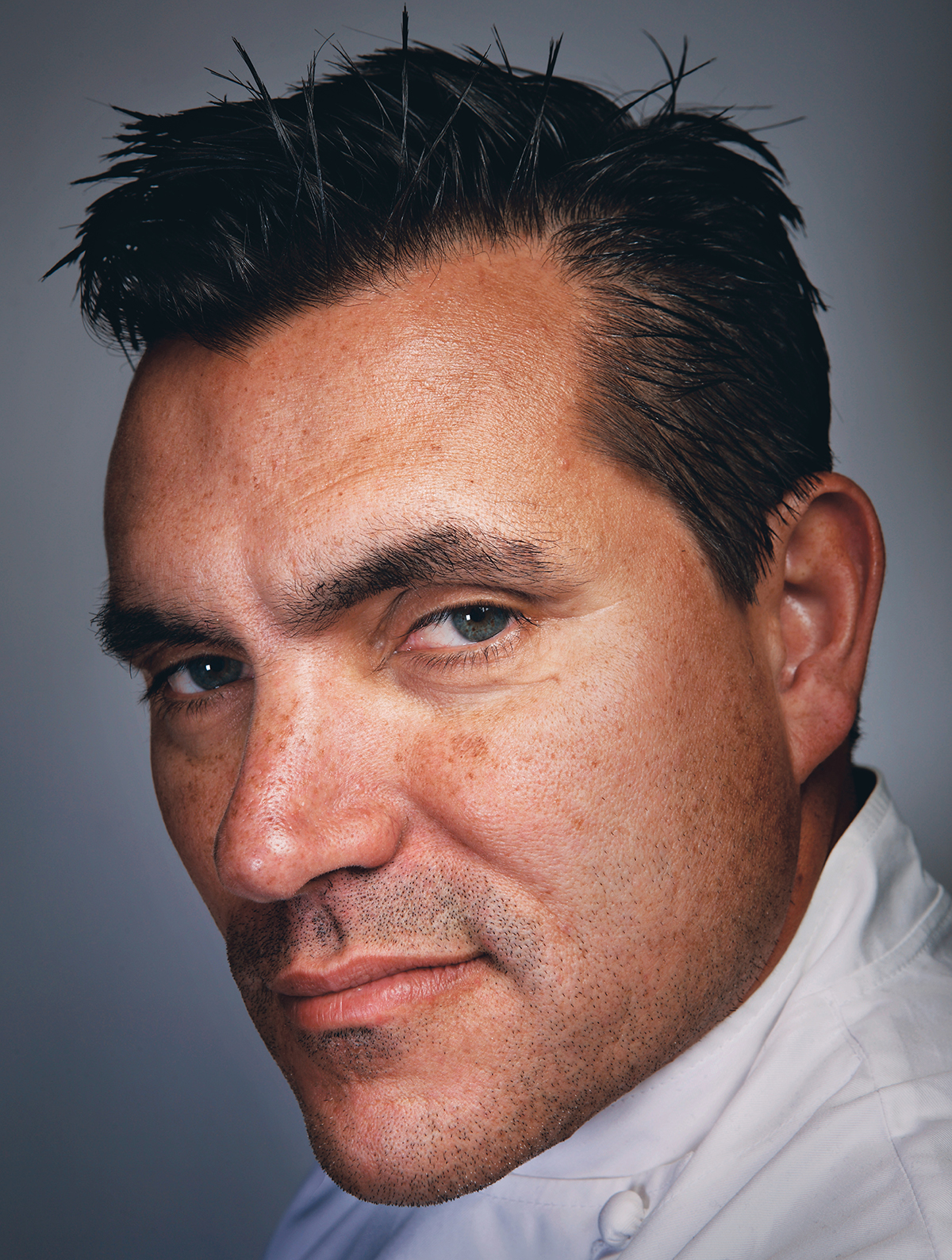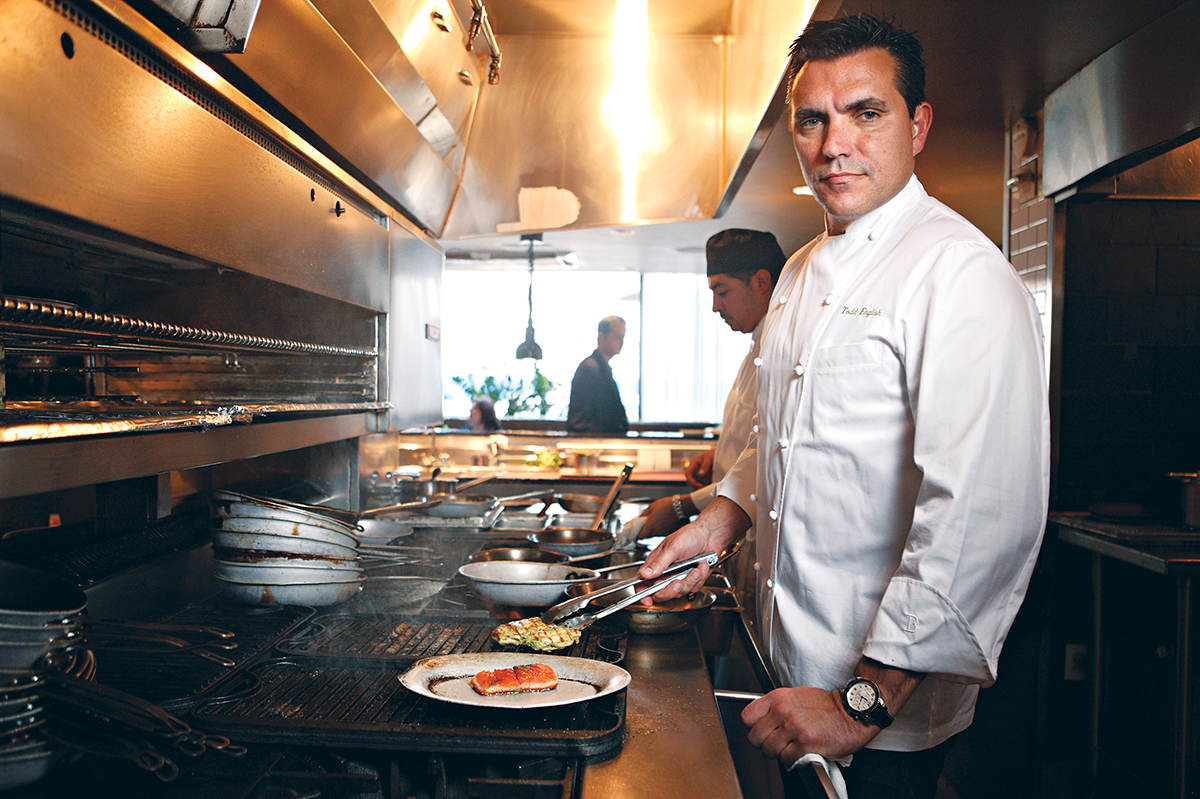Reconsidering Todd English

Photograph by Ben Baker
If there’s any doubt about Todd English’s mainstream star power—any doubt after the People magazine stories and Top Chef appearances and Hollywood schmooze fests—the mood at Olives New York on this late-February afternoon would silence the skeptics. English is in the restaurant for the day, a brief stopover for this empire-builder who spends more than half his time on the road, and the bartenders and hosts have that hyperanimated, I’m-with-the-band vibe that surrounds roadies and inner-circle groupies. Even before English emerges from the back office, where he’s been changing into chef’s whites, diners are looking around as if they can tell: Someone famous! Here.
He carries himself like a celebrity, too, flashing a signature half smile that gives the impression he’s mistaken you for a camera. He has gone on record in the past admitting that he’s naturally shy, explaining that his ability to work a room was a learned skill. It’s clear he’s gotten the hang of it.
Oh, how far he’s come in the 20 years since he opened his first Olives in Charlestown in April 1989. At 48, English is a multimillionaire with a stable of 21 restaurants across the country, and even aboard the Queen Mary II and Queen Victoria cruise ships. His newest properties, the Libertine (New York) and Cha (Washington, DC), are products of a deal with the Thompson boutique hotel chain. His Latin steakhouse, Beso, which he opened in L.A. last year with Desperate Housewives star Eva Longoria, still attracts crowds of Hollywood pretty people (and tourist looky-loos). He makes frequent television appearances, most notably on Top Chef. And this month, the second season of his WGBH-produced series, Food Trip, will premiere. “I have so many concepts that I’m working on,” English says. “I do really get excited about that.”

English working the grill at olives New York. “You’ve got Corporate Joe who names a pizza after a game and makes how much money? Billions. Billions for selling cardboard to America…I thought we as chefs should have that same opportunity.” (Photograph by Ben Baker)
Yet despite all that achievement, or likely because of it, the popular line on English is that he’s half the chef he used to be, a boob who’s spent the better part of the last decade distancing himself from his hometown, and, God forbid, from his kitchens. The English brand has come to eclipse English the chef, and of course this troubles the purists and media types whose adoration first brought him to fame. These days the high priests of the food bloggerati, in particular, seem to take special pleasure in framing him as the epitome of a sellout celebrity chef. “Yeah, Chowhound has beat me up a lot,” English says. “I don’t even read it anymore. It probably took me a couple of bad articles to realize that maybe I was misunderstood.”
If you think about his actual ambitions—as opposed to what we assume they should be—maybe he is misunderstood. I’ll go one further: Maybe it’s time to reconsider the accepted image of Todd English. According to him, the critics never grasped what he was after. He had no intention of sacrificing himself on the altar of haute cuisine. “I remember going back to La Côte Basque over the years,” he says of New York’s legendary French restaurant, which closed in 2004. “I watched the stars fade away and the ambition fade away. I learned from a ton of really burned-out chefs at the Culinary Institute. That’s what this business will do.”
English never wanted to end up in a precious little bistro, recalling his glory days while plating his millionth serving of steak frites. To him, that was the opposite of success. What he wanted was to be famous, to build an empire. And by that measure, certainly, things are exactly where he wants them.
In some ways it’s strange that English isn’t still embraced as the local darling he once was. Consider the food scene before he and then-wife Olivia opened their tiny storefront in 1989. “Boston before Todd was really just a terrible place to eat,” says GQ food critic Alan Richman. “I used to eat at Anthony’s Pier 4—and it’s not like I was giving up anything to eat at Anthony’s Pier 4.” (Even after Olives debuted, Richman had plenty of beef with Boston’s restaurants, leveling them a humiliating blow in 1997.)
Ours was a city of scrod and lobster, bad pizza and “Continental” starch. There were bright lights: Lydia Shire and Jasper White, Jody Adams and Gordon Hamersley. But English was the first on the scene with both cooking chops—honed at the Culinary Institute of America and La Côte Basque, then cemented at Michela’s in Cambridge—and the mediagenic looks to lure the cameras. It was his considerable good fortune to ascend just as fine dining was emerging as a cultural obsession.
Ask anyone who dined at Olives in those first years, and they’ll recall the line stretching around the corner. English’s food was big, both in portion and in flavor. A single dish would contain elements sweet, sour, salty, bitter, crunchy, and soft (smoked duck breast lacquered with sweet ginger-orange glaze sitting atop a crispy-salty scallion pancake, the signature fig and prosciutto pizza). He had an uncanny ability to pull it all together into something transcendent—at least most of the time. He could just as easily go off the rails, but what mattered was that this was food that Boston had never tasted before. And that was thrilling. His acclaim attracted a crew of future stars to his kitchen, among them Barbara Lynch and Marc Orfaly. “It was one of the best and one of the toughest jobs I’ve ever had,” says Lynch, who spent five years with English before ultimately opening her award-winning No. 9 Park. “By 5 o’clock, I was ready to throw up in a bucket from stress.”
“I was in there, animalistic, every night,” English says. “It was crazy.” He was famous for rewriting the menu right before opening, the only time he had to brainstorm and create.
Success spawned opportunity. Soon came the Figs pizza chain, the Olives outposts, more restaurants, the cruise-ship deals. By 2002, English was pursuing everything from frozen pasta to model kitchens made by a Las Vegas design firm. “When I met him, he was interested in a Todd English cologne and a Todd English watch,” says Juliette Rossant, author of the 2004 book Super Chef. To a growing chorus of detractors, he was losing sight of his food. There were very public fallings-out with business partners and charges of absenteeism. During one two-week span in 2002, the city of Boston twice shuttered Olives Charlestown for health-code violations. The negative impressions formed then have been tough to shake, even years later.